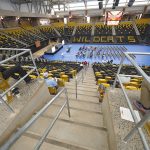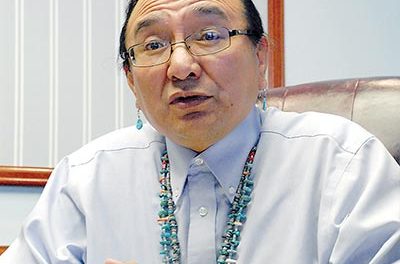
Capitol Briefs | Next Hardship assistance session set for Tucson
WINDOW ROCK
The next session for Diné who want to apply for Hardship Assistance or Certificate of Indian Blood will be April 7 to 8 in Albuquerque, according to the president’s office.
Staff from the Navajo Nation controller’s office and the Office of Vital Records & Identification were on hand to help from 9 a.m. to 3 p.m. at the Arizona Forge at Roy Place in Tucson.
COVID-19 protocols will be in place, and all attendees must wear a face mask.
On Feb. 17 and 18, the two offices helped about 590 families in Phoenix. And, on March 3 and 4, families in Tucson were helped.
Due to the high demand for services, more dates will be announced for technical assistance events in Phoenix.
Other upcoming assistance sessions will be held at the following dates and locations:
• April 7 to 8 from 9 a.m. to 4 p.m. at the Southwestern Indian Polytechnic Institute (9169 Coors Blvd. NW) in Albuquerque.
• April 14 to 15 from 9 a.m. to 4 p.m. at the Urban Indian Center of Salt Lake (120 W 1300 S. St.) in Salt Lake City.
• April 28 to 29 from 9 a.m. to 3 p.m. at the Denver Indian Center Inc. (4407 Morrison Rd.) in Denver.
In December, President Jonathan Nez had proposed $207 million, or $600 for each adult, but on Dec. 29 the Navajo Nation Council increased the amount to $557 million for Hardship Assistance for payments of $2,000 for adults and $600 for children.
Applications for the American Rescue Plan Act Hardship Program are being accepted until Dec. 30, 2022.
The controller’s office completed the mailing of Hardship Assistance checks for approximately 46,000 Navajo elders who are 60 or older and who previously received the CARES Act Hardship Assistance.
The next step is printing and mailing of Hardship Assistance checks for all other previous recipients.
The application form is available at https://www.nnooc.org and at https://www.navajonationarpa.org.
Information: ARPAHardship@nnooc.org or call 928-871-6106, 928-871-6315, 928-223-3525, 928-224-8148, 928-224-8187, 928-224-8212, 928-371-9226, 928-223-3709 or 928-223-3712.
‘Uncontrolled spread’ warning sent to 31 chapters
WINDOW ROCK – Based on the number of coronavirus cases from Feb. 11 to Feb. 24, the Navajo Department of Health has issued a warning for the uncontrolled spread of the virus to 31 of the 110 chapters.
These chapters include Aneth, Baca/Prewitt, Bread Springs, Casamero Lake, Chilchinbeto, Chinle, Church Rock, and
Coyote Canyon, Crownpoint, Ganado, Kayenta, Low Mountain, and
Many Farms, Naschitti, Newcomb, Pinon, Pueblo Pintado, and
Rock Point, Rock Springs, Rough Rock, Sheepsprings, Shiprock, Smith Lake, Tachee/Blue Gap, Teecnospos, and
Thoreau, Tohatchi, Tsaile/Wheatfields, Twin Lakes, Two Grey Hills and Whippoorwill.
Women’s History Month: March 2022
WASHINGTON – The U.S. Census Bureau reports that National Women’s History Month traces its roots to March 8, 1857, when women from various New York City factories staged a protest over poor working conditions.
The first Women’s Day celebration in the United States was in 1909, also in New York City.
More than seven decades later, Congress in 1981 established National Women’s History Week to be commemorated annually the second week of March.
In 1987, Congress expanded the week to a month and every year since has passed a resolution (and the president has issued a proclamation) designating March as Women’s History Month.
“As we celebrate Women’s History Month 2022,” the bureau said, “we reflect upon advances women have made over the last decade. Women have increased their earnings, education and fields of occupation, and continue to have longer average life spans than men.”
Below are some Census Bureau stats highlighting these and other changes over the years.
• 164.8 million – The number of females of all ages in the United States. There were 159.9 million males of all ages (Source: 2019 American Community Survey, 5-Year Estimates).
• 2 to 1 – The approximate ratio of women to men ages 85 and older (4.1 million to 2.2 million) in the United States (Source: 2019 American Community Survey, 5-Year Estimates).
• 20.7% – In 2019, the percentage of women 25 and older with a bachelor’s degree as their highest degree; 19.9% of men had a bachelor’s degree as their highest degree (source: 2019 American Community Survey, 5-Year Estimates).
• 80.8% – Women’s median earnings as a percentage of men’s median earnings, for full full-time, year-round workers 16 years and older (Source: 2019 American Community Survey 5-Year Estimates).
Speaker hosts top federal official
WINDOW ROCK – Last week, Speaker Seth Damon and Navajo Nation Council delegates met with Bryan Newland, assistant secretary for Indian affairs in the U.S. Interior Department, the speaker’s office reported Tuesday.
Also, Gregory Mehojah, Navajo Regional director for the Bureau of Indian Affairs, attended the meeting in the Council Chamber.
Newland visited New Mexico and Arizona over four days for meetings with officials of the Hopi Tribe, Gila River Indian Community, Ak-Chin Indian Community, Havasupai Tribe, Hualapai Tribe, All Pueblo Council of Governors and the Navajo Nation.
Although the speaker’s office news release did not include whatever Newland said, discussion centered on climate change, infrastructure degradation, American Rescue Act Plan project funding, and the water crisis in the Southwest.
President Joe Biden sent the message that sovereign nations in the country are a top priority, Damon said.
More than $11 billion for new projects will be funded around Indian Country.
Newland is a citizen of the Bay Mills Indian Community (Ojibwe), where he recently served as president and chief judge.
From 2009 to 2012, he was a counselor and policy advisor to former Indian Affairs Assistant Secretary Larry Echo Hawk during the Obama administration.
Proclamation honors social workers
WINDOW ROCK – A proclamation was signed on Tuesday recognizing the month of March as “Navajo Nation Social Work Month” to honor all social workers, the president’s office reports.
The proclamation states that social workers improve the well-being and quality of life for Navajo families, especially during the COVID-19 pandemic.
President Jonathan Nez said social workers “provided essential services to support and strengthen Navajo families” and “they strive to improve the overall welfare of our citizens by assisting with everyday problems.”
The Nez-Lizer administration thanks all social workers, advocates and all who provide support for Navajo families and children.
As a public service, the Navajo Times is making all coverage of the coronavirus pandemic fully available on its website. Please support the Times by subscribing.
How to protect yourself and others.
Why masks work. Which masks are best.
Resources for coronavirus assistance







 Highway 264,
Highway 264, I-40, WB @ Winslow
I-40, WB @ Winslow